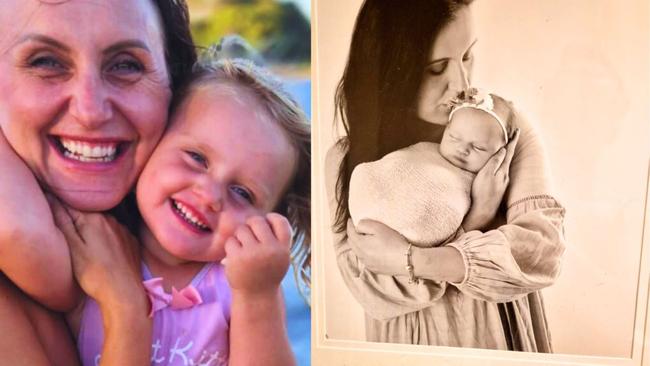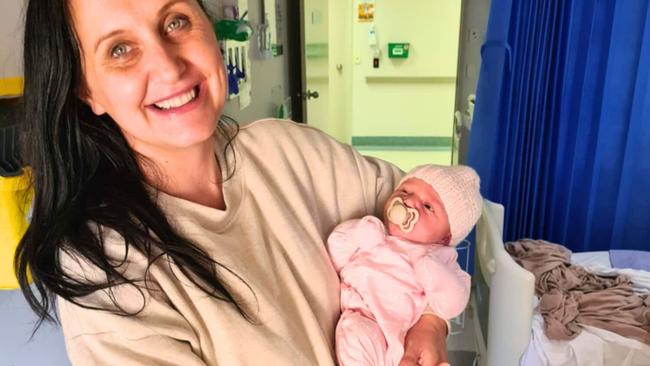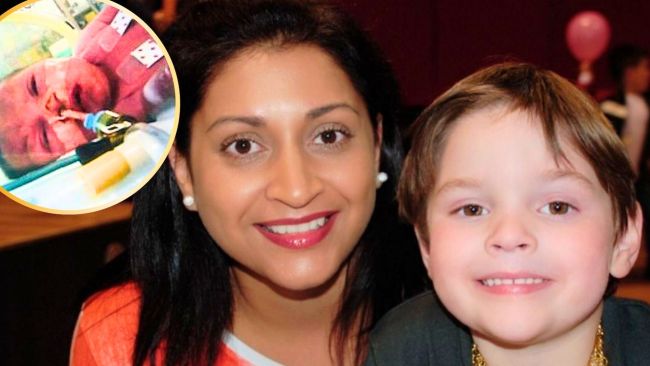‘My baby girl came after the morning after pill’
EXCLUSIVE: “The pharmacist asked a few questions, said it was fine; but there were more things I should have known.”
Conception
Don't miss out on the headlines from Conception. Followed categories will be added to My News.
Having a night out with her partner five months after welcoming their baby girl was something Ellie had long looked forward to.
That evening, however, ended very differently than she was prepared for - and it would be one that would change their lives forever.
That night, in December, 2021, Ellie and Frankie had sex using their usual method of contraception: the pull out method.
But on that occasion, it didn't work as planned.
Want to join the family? Sign up to our Kidspot newsletter for more stories like this.
RELATED:‘ I didn’t look pregnant until the start of my third trimester’
"I thought we were probably fine"
“The pill and other things had made me feel unwell before,” the Perth mum tells Kidspot.
“I was still breastfeeding day and night, and I’d just gotten my period, but it wasn’t regular yet so with all that, I thought we were probably fine.”
Nevertheless, Ellie went to the pharmacy the next day to take the morning after pill “just as a precaution”.
“They asked when I had unprotected sex, whether I’d used protection, and when I had my period - and I told them it had only just started and wasn’t regular yet, so I wasn’t quite sure,” the 38-year-old recalls.
“They said it was all fine and gave it to me.”
Having taken the morning after pill three times earlier in life with no resulting pregnancies, Ellie was confident that it would work once again.
“They added that if I vomited from the nausea side effects, that I should take another one, but that didn’t happen to me.”

RELATED: For nine months I ‘forgot’ I was pregnant, because of my past experiences
"Two pregnancy tests were positive"
A month later, Ellie noticed her breasts becoming sore and was feeling more tired than usual.
“I thought, ‘Oh, this isn’t normal’, and I called Frankie thinking I may be pregnant.”
The mum-of-four’s instincts were right.
“I took two pregnancy tests the next day and they were both positive,” she remembers emotionally.
“It was such a shock. I cried and in that moment, I wanted to terminate it. I was exhausted from having a six-month-old who wasn’t sleeping well and I was going back to work in a few months as we needed that financially - life was so overwhelming at that point.”
When she called Frankie to share the results, Ellie became even more torn over the decision.
“Paige is his first biological child and he was happy because he’d always wanted more kids, so that caused some issues in the relationship, but we got through it together,” she says of her 38-year-old partner.
And yet, painfully, the couple mutually decided to take steps to end the pregnancy.
“To have an abortion, you need to have a six-week scan first,’ Ellie says of the most anguished time in her life.
“They turned on the sound and I heard the heartbeat. I went home and I said to Frankie, ‘I can’t do it. Let’s keep the baby’.”
With the life-changing decision made, Ellie says her pregnancy became “easy” after those incredibly tough few weeks.
“We were just committed to make it all work,” she says.
“It was obviously a bit harder this time with a toddler and having to go back to work but I was so happy and had no regrets.”

"We are just so grateful"
Ellie’s baby girl, Madison, arrived safely on her due date, much to the elation of her parents and siblings, Mila, 15, Cassius, 14, and Paige, three.
“I felt complete ecstasy and gratitude to have her in my arms,” Ellie smiles.
But then Frankie noticed something wasn’t right with his daughter’s right eye just hours after her birth.
“She has a growth and we don’t know yet how that may affect her vision in the future,” Ellie says.
“That was heartbreaking and we don’t know how or why she came to have it, but we are grateful she is okay.”
Ever since the birth, Ellie has been open about her journey with Madison, making a point to educate her 15-year-old daughter about ovulation, contraception, and the complications involved using the morning after pill.
“I tell her that it doesn’t always work, that she needs to be very careful [about contraception], and not rely on [the morning after pill] as a defence,” she explains.
“I was unknowingly in my ovulation period when I took it, which I found out later makes it less effective, but that wasn’t discussed with me, so I want her to be aware about that. I just thought it would work whenever I took it and no one told me otherwise.”
Ellie and Frankie, meanwhile, are using a much more “reliable” method of contraception these days and enjoying every moment of watching two-year-old Madison - who is “definitely” the last piece of their completed family - grow up.
“Paige and Madison are best friends,” she says happily.
“When one goes to daycare and the other goes to preschool, they give each other a kiss and a cuddle and say, ‘miss you’.”
Life with four children and working a full-time job in banking is hectic as can be for this strong mum, but she wouldn’t have it any other way.
“I always think she’s our miracle baby,” she says, holding back tears.
“Every day that we get to be her parents and play with her, we are just so grateful. I think about how close she came to not being with us and it brings me so much closer to her. She was meant to be here and there was nothing to stop her from coming.”
The morning after pill
Australian Medical Association Queensland President, Dr Nick Yim, says the morning after pill is not always “100 percent effective”.
“The morning after pill needs to be taken quickly after unprotected sex,” the GP explains.
“It works by trying to prevent or delay ovulation, and within 24 to 48 hours, it’s the most effective, but it can work up to four to five days after. The key thing to consider is that not all morning after pills are 100 percent effective, so we recommend having a pregnancy test at least two weeks after taking the pill.”
Dr Yim, who has also practised as a pharmacist in his medical career, says there are several factors which can impact the morning after pill’s efficacy.
“A common side effect of the morning after pill can be vomiting, so if the woman does vomit, that will render it ineffective,” he advises.
“The weight of a woman and if she has had gastric surgery can impact its efficacy as well. If someone is overweight, for example, they may need a higher dose and they should talk to their GP or pharmacist for that advice.”
Additionally, he does not recommend using the menstruation cycle as a form of contraception.
“We know that using the fertility cycle as a method of pregnancy protection is not effective,” he says.
“Ovulation does generally occur between day 12 to 14 but each woman’s cycle is different and sperm can stay viable in the tract for many days, so if you have sex on day 12 but you haven’t ovulated yet, it’s difficult to gauge whether it is a safe time or not.
"Having unprotected sex puts individuals at risk of falling pregnant, so the key message is to have a conversation with your GP about contraceptive methods. The morning after pill is recommended for an emergency situation. Contraception such as condoms, the pill and the mirena are all effective methods.”
More Coverage
Originally published as ‘My baby girl came after the morning after pill’





